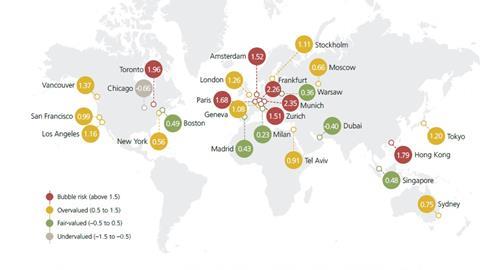Five European cities as well as Toronto and Hong Kong are in bubble risk territory, according to a new report issued by UBS Global Real Estate.

According to the study, which analyses residential property prices in 25 major cities around the world, the Eurozone stands out as the region with the most overheated housing markets.
Munich and Frankfurt top the ranking. Paris and Amsterdam closely follow suit, treading on bubble risk territory alongside the two German cities. Similarly, Zurich, Toronto, and Hong Kong also display high imbalances.
In contrast to last year, Vancouver's housing market is now on the overvalued range of the spectrum, sharing the same territory with London, San Francisco, Los Angeles, and, to a lesser extent, New York.
On average, inflation-adjusted annual price growth rates in the cities analyzed have accelerated in the last four quarters. In many European metropolitan areas, prices soared by more than 5%, with Munich, Frankfurt, and Warsaw leading the way.
Price growth in the Asian and American cities, with the exception of Sydney, remained in a low-to-mid single-digit range. Madrid, San Francisco, Dubai, and Hong Kong are the only cities that saw a decline in prices. The last time there were fewer cities with negative price growth was in 2006.
Governments supported market resilience, but uncertainty looms
Despite the pandemic, housing markets have remained resilient in the first half of 2020. The study discerns three main reasons for this outcome. First, home prices are a backward-looking economic indicator and are only able to reflect an economic downturn with a certain delay. Second, the majority of potential home buyers did not suffer direct income losses in the first half of 2020. Credit facilities for companies and short-time work schemes mitigated the fallout from the crisis. Third, governments supported homeowners in many cities during the lockdown periods. Housing subsidies were increased, taxes lowered, and foreclosure procedures suspended.
‘It is uncertain to what extent higher unemployment and the gloomy outlook for household incomes will affect home prices. However, it’s clear that the acceleration over the past four quarters is not sustainable in the short run,’ said Mark Haefele, Chief Investment Officer at UBS Global Wealth Management. ‘Rents have been falling already in most cities, indicating that a correction phase will likely emerge when subsidies fade out and pressure on incomes increase.’
Matthias Holzhey, lead author of the study and Head of Swiss Real Estate Investments at UBS Global Wealth Management, added: ‘The current cities at bubble risk seem to be weathering the coronavirus crisis relatively well. The local economies in Munich, Toronto, and Hong Kong will likely recover quickly. But even in the absence of a broad market correction, the potential for further capital gains seems depleted. In particular, the prospects for buy-to-let investments are poor given the record-high price-to-rent ratios.’










